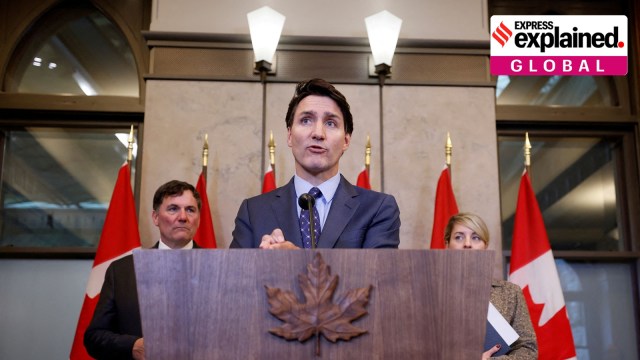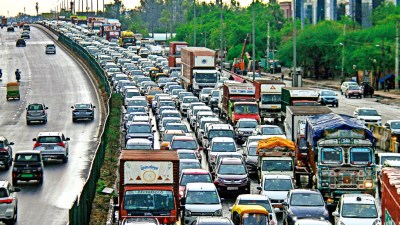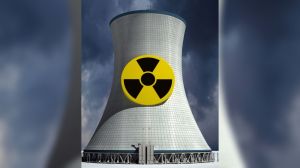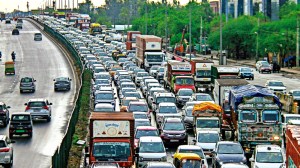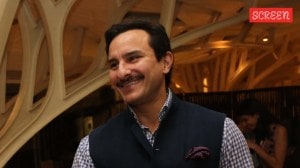Canada Expels Indian Diplomats: India’s ties with Canada have hit an all-time low after Justin Trudeau’s government accused Indian officials of engaging in “activities that pose a significant threat to public safety”, allegations New Delhi dismissed as “preposterous”.
The row started last year, when Canada suggested the role of Indian diplomats in the Hardeep Singh Nijjar assassination case.

While Trudeau and other Canadian officials have used very strong language against India, what are the specifics of the allegations, and what evidence has been publicly provided to support them? Here’s what the Canadian police have said, and what some Canadian and American media outlets have reported citing sources.
What has the Canadian police said?
In a press conference on Monday, Royal Canadian Mounted Police (RCMP) Commissioner Mike Duheme claimed an “extraordinary situation is compelling us to speak about what we have discovered in our multiple ongoing investigations into the involvement of agents of the Government of India in serious criminal activity in Canada.”
The RCMP’s website has a press statement detailing some of the allegations. “Through our national taskforce and other investigative efforts, the RCMP has obtained evidence that demonstrates four very serious issues: Violent extremism impacting both countries; Links tying agents of the Government of India (GOI) to homicides and violent acts; The use of organised crime to create a perception of an unsafe environment targeting the South Asian Community in Canada; and Interference into democratic processes,” the statement says.
“Investigations have revealed that Indian diplomats and consular officials based in Canada leveraged their official positions to engage in clandestine activities, such as collecting information for the Government of India, either directly or through their proxies; and other individuals who acted voluntarily or through coercion. Evidence also shows that a wide variety of entities in Canada and abroad have been used by agents of the Government of India to collect information. Some of these individuals and businesses were coerced and threatened into working for the Government of India. The information collected for the Government of India is then used to target members of the South Asian community,” it adds.
On “threats” and “coercion”, media outlets have reported that people were either threatened about the status of their visa and other papers, or that their family members in India would be harmed.
Story continues below this ad
The statement claims “evidence was presented directly to Government of India officials, urging their cooperation in stemming the violence”. However, it does not specify what this “evidence” is.
It also seeks “the public’s assistance in reporting incidents of foreign interference by the Government of India”, and says that “anyone who feels threatened online or in person, should report the incident to their local police.”
What media organisations have added to this
According to the Toronto Star, “…things ramped up in earnest about six weeks ago.The RCMP had by then determined a pattern in a series of investigations in a number of cities across Canada, the sources said: it appeared Indian diplomats and consular officials in Canada were conveying information about the movements and activities of certain Canadians back to Indian intelligence officials in India’s external intelligence agency, the Research and Analysis Wing, known as RAW.”
The report, by Tonda MacCharles, Ottawa Bureau Chief, adds that this information “appeared to be then conveyed to a criminal gang in India, whose leader Lawrence Bishnoi is in Indian prison custody but uncharged, and in turn passed on to individuals in Canada who police allege are “agents of India” acting to intimidate, threaten and even kill Canadians.”
Story continues below this ad
The report says that 22 people stand charged with extortion, or acts of intimidation, coercion, threats and harassment that “Canadian authorities now see as likely connected to agents acting at the Indian government’s direction”, while the police have warned “13 Canadians since last September that they are potential targets of Indian agents.”
The report also claims that “India had first agreed to meet but then denied visas to RCMP personnel to go to India last week to share police evidence.”
The Globe and Mail quoted an unnamed senior Canadian official as saying that “texts and messages from Indian officials about intelligence gathering and attacks on Sikhs in Canada were shared with Prime Minister Narendra Modi’s national-security adviser Ajit Doval and Minister of Home Affairs Amit Shah”, but despite the “strong evidence”, Indian officials “flatly denied the allegations.”
The most detailed allegations are in an article in The Washington Post, which quotes an unidentified Canadian official as saying that “a senior official in India and a senior official in RAW” had “authorised the intelligence-gathering missions and attacks on Sikh separatists”.
Story continues below this ad
While the India-Canada row first began over the killing of Khalistani activist Hardeep Singh Nijjar in Surrey last year, the WaPo report also linked the killing of one Sukhdool Singh in Winnipeg to the Indian government. Sukhdool Singh Gill alias Sukha Duneke was shot on September 21 last year. Duneke was wanted in Punjab in cases of extortion, attempt to murder and murder. He was also chargesheeted by the National Investigation Agency, alleging that money he extorted was used to fund the cause of Khalistan.
The WaPo report says, “Officials said the investigation has uncovered evidence of Indian government involvement in home invasions, drive-by shootings, arson and at least one additional killing,” that of Duneke.

